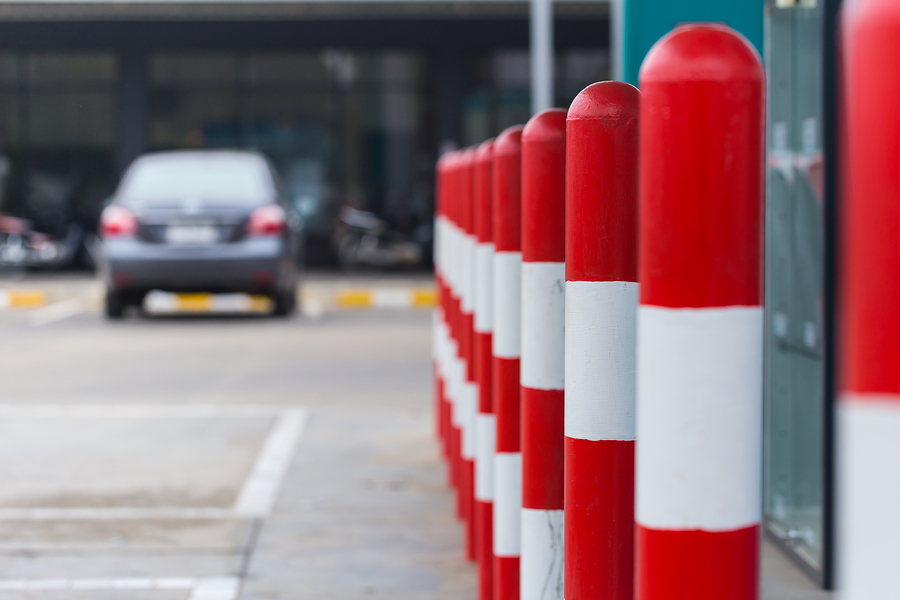Why Install Wheel Stops On A Car Park?
Under local regulations, parking facilities require stops or safety barriers that ensure vehicles stop at their designated location. They also help control vehicle traffic in a parking area.
However, most car park operators think they no longer need wheel stops if their car parks already have concrete kerbs. Car park operators should remember that wheel stops are required if the kerb is higher than 100mm. This is to prevent the front skirts of legal-height vehicles from being damaged if they contact the kerbs. Concrete wheel stops greater than 100mm in height should also be prohibited.
It is specified in the Australian Standard AS2890.1:2004 that the physical dimensions for wheel stops should be between 90 and 100mm in height and 1650 +/- 50mm in width.
What Are Rubber Wheel Stops?
Just like Parking Curbs, Parking Blocks, and Car Stops, Rubber Wheel Stops ensure that the vehicles stop at the correct place when parking. They simply prevent damage to establishments like buildings, sidewalks, kerbs, and luxurious landscapes. They also serve as bumper cushions and protection for mechanical carts, forklift trucks, and vehicles operating in big factories and warehouses when installed indoors. These rubber wheel stops are idyllic for parking lots and parking garages. They provide necessary order by allocating parking lots and ensuring appropriate distancing and spacing.
How Durable Are Rubber Wheel Stops?
Most rubber wheel stops are made of durable compounded rubber and plastic, so they won’t easily crack, chip, corrode, rust, or crumble over time. Aside from that, they are easy to install and only do little damage to cars when they hit them accidentally.
You must ensure that the rubber wheel stops you install are durable and a reliable substitute for traditional concrete and plastic stops. There are affordable rubber wheel stops that don’t require installing heavy lifting equipment. Using rubber wheel stops can save you a lot of money. The traditional concrete wheel stops cost six times more because they easily crack and require maintenance.
Things to Consider Before Installing Rubber Parking Stops
- Before installing a wheel stop or a rubber parking stop, check to make sure your alterations satisfy any local requirements or building codes.
- You also need to identify the kind of parking space you will install the rubber parking stops on. Is it for a residential car park, commercial car park, or industrial car park? This will help you determine what vehicles usually park in the area.
- Last, but not least, it’s important to know the volume of traffic in the area. Is the traffic high or low?
With this in mind, choose the most durable and appropriate rubber parking stop for your area. Now, you are ready for the installation.
How Are Rubber Parking Stops Installed?
- Identify the area where you want to install the rubber parking wheel stops.
- Position the Wheel Stop where it will be secure and drill a guide hole through each hole in the Wheel Stop. You can use a hammer drill and see to it that the masonry drill bit has the appropriate size.
- Brush away the accrued dust.
- Put the Wheel Stop over the holes and line them up. After that, hammer the supplied road spikes through the Wheel Stop and drill into the road surface.
Make Wheel Stops Part Of Your Overall Safety And Security Plan
When planning your traffic management process, you’ll often want to include several different deterrents, including Wheel Stops. No one product can effectively manage vehicle safety and security – it’s always a combination of tools that work together to ensure your premises are safe and secure. For more on optimising vehicle management and security, read the pedestrian security in car parks complete guide.
Where Can I Get Premium Rubber Wheel Stops?
As a supplier of high-quality rubber wheel stops, Image Bollards is your go-to. Not only do we stock a range of styles, but our team is experienced in the installation process and can give qualified advice on which type will best suit your business. Call us, and we’ll discuss the best wheel stop options for commercial or residential use.

